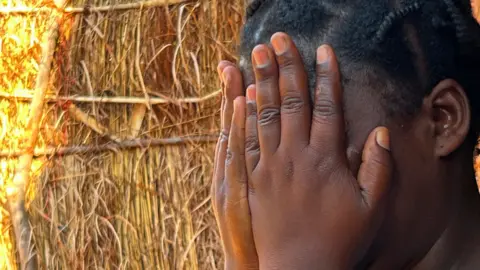|
|
The Malawi WhatsApp group that saved women trafficked to Oman
Money Land Forum / News / The Malawi WhatsApp group that saved women trafficked to Oman (5 Posts | 60 Views)
(1) (Go Down)
|
The Malawi WhatsApp group that saved women trafficked to Oman by ayodeji11(m) : 4:45 am On Mar 18 |
 BBC Africa Eye investigates how a WhatsApp group facilitated the rescue of over 50 Malawian women who were trafficked to Oman and subjected to conditions akin to slavery. Warning: Some individuals may find the details in this narrative distressing. As she recounts the ordeal she endured while seeking a better life, a 32-year-old woman breaks down in tears. Georgina, like all the trafficked women interviewed by the BBC, chose to withhold her full name. Initially lured under the pretense of a driving job in Dubai, Georgina, who had previously owned a small business in Lilongwe, Malawi's capital, found herself ensnared in a harrowing situation upon landing in Muscat, Oman's capital. Realizing she had been deceived, Georgina was compelled to work grueling hours, seven days a week, by a family who had entrapped her. "I reached a point where I couldn't take it," she recounts, describing how she barely received two hours of sleep. Her distress intensified when her employer began coercing her into sexual acts, threatening violence if she dared to speak out. "It wasn't only him," she says. "He would bring friends and they would pay him after." She struggles to speak as she recounts how she was forced into an*l sex: "I got badly injured. I became so distraught." It is estimated there are around two million female domestic workers in the Gulf Arab states. In a survey of 400 women in Oman by migrant charity Do Bold, published by the 2023 US State Department Trafficking in Persons Report, almost all were found to be victims of human trafficking. Nearly a third said they were sexually abused, while half reported physical abuse and discrimination. After several weeks, Georgina became desperate and in a post on Facebook she begged for someone to help her. Thousands of miles away in the US state of New Hampshire, 38-year-old Malawian social media activist Pililani Mombe Nyoni saw her message and began to investigate. She got in touch and got the Facebook post removed for Georgina's safety and passed on her own WhatsApp number, which began to circulate in Oman. She soon realised it was a wider problem. "Georgina was the first victim. Then it was one girl, two girls, three girls," she told the BBC. "That's when I said: 'I am going to form a [WhatsApp] group because this looks like human trafficking.'" More than 50 Malawian women working as domestic workers in Oman joined the group. Soon the WhatsApp group was full of voice notes and videos, some too harrowing to watch, detailing the horrific conditions the women were enduring. Many had their passports taken away as soon as they arrived, preventing them from leaving. Some told of how they had shut themselves in toilets to secretly send their pleading messages. "I feel like I am in prison… we can never escape," one said. "My life is really in danger," another said. Ms Nyoni began speaking to human trafficking charities in Malawi and was introduced to Ekaterina Porras Sivolobova, founder of Do Bold, based in Greece. Do Bold works with a community of migrant workers in the Gulf countries, identifying victims of trafficking or forced labour and then negotiates with their employer for them to be released. "The employers pay an agent for providing a domestic worker. One of the most common challenges that we face is that the employer or agent says: 'I want my money back, then she can go home'," Ms Sivolobova told the BBC. "The laws that are in place [in Oman] prohibit a domestic worker to leave the employer. She cannot change jobs and she cannot leave the country - no matter how you are treated." This is what is known in the Middle East as the "kafala" labour system, which ties workers to their employers for the duration of their contract. Oman's National Committee to Combat Human Trafficking told the BBC the relationship between the employer and the domestic worker was contractual - and unsettled disputes can be referred to a court within a week. It added that an employer was not allowed "to impose any form of forced labour on the worker" and could not keep a worker's "passport and private documents without his written consent". After three months in Muscat, and with the help of Ms Nyoni and someone in Oman, Georgina returned to Malawi in June 2021. "After I helped Georgina, I felt so mad, I felt so angry," says Ms Nyoni. Georgina's case allowed her to raise the alarm within Malawi - and pressure began mounting on the government to intervene. Malawian charity Centre for Democracy and Economic Development Initiatives (CDEDI) launched an Oman rescue campaign, calling on the authorities to bring the women home. Blessings was another of the women in Ms Nyoni's WhatsApp group. The 39-year-old had travelled to Muscat in December 2022, leaving her four children with her sister, Stevelia, in Lilongwe. She was severely burned in the kitchen of the home she was working in, but her employer would not let her return to Malawi. "The degree of the burns, trust me, I saw my sister losing her own life," Stevelia told the BBC. "I remember my sister said: 'Sister, I came here because I needed a better life, but should I die, please take care of my kids.' That hurt me." Stevelia began lobbying for her sister to be brought home. At first the agent angrily told the family that Blessings was dead, but this was not true and she finally returned last October, with the help of the Malawian government. "I never thought there would come a time that I would see my family again, my children," Blessings told the BBC shortly afterwards. "I had no idea that there are people on this earth who treat others like slaves." The Malawian government, which also worked with Do Bold, says it has spent more than $160,000 (£125,000) to bring 54 women back from Oman. But 23-year-old Aida Chiwalo returned home in a coffin. There was no autopsy or investigation done in Oman after her death. Oman's authorities said the labour ministry had not received any complaints from domestic workers of Malawian nationality in 2022 and only one complaint in 2023 that had been settled. "The majority of these women have been released because money has been paid to the employer, from $1,000 to $2,000," says Ms Sivolobova. "So basically, their freedom had to be bought. And that's what bothers me. How can you buy somebody else's freedom?" A spokesperson from Malawi's government told the BBC it was developing rules "to ensure safe, orderly and regular migration that benefits migrants, their families and the country at large". But Ms Nyoni, whose WhatsApp group is now more of a support forum for the returnees, says the issue of trafficked domestic workers to Oman highlights a bigger problem in Malawi - that of poverty and unemployment. "If the young girls had an opportunity to have jobs in Malawi, they were not going to be trapped. We need to fix the nation so that these youngsters will never be trapped like this." For Georgina, the trauma has been hard to put behind her. She finds it calming to go down and look out over Lake Malawi, one of Africa's biggest. "When I watch the waves, it reminds me that nothing in life lasts forever. One day all this will be history," she says. "I find peace and encourage myself that I will return to how I was - the old Georgina, who was independent." |
|
Re: The Malawi WhatsApp group that saved women trafficked to Oman by Adorable(f) : 2:08 pm On Mar 18 |
|
Good one
|
|
Re: The Malawi WhatsApp group that saved women trafficked to Oman by MissNina(f) : 3:10 pm On Mar 18 |
|
Goodnews
|
|
Re: The Malawi WhatsApp group that saved women trafficked to Oman by Chairman(m) : 2:04 am On Mar 19 |
|
Nice one
|
|
Re: The Malawi WhatsApp group that saved women trafficked to Oman by nanbal272(f) : 7:48 pm On Mar 23 |
|
Good to hear
|
(1) (Reply)
(Go Up)
| Money Land Forum - Copyright © 2016 - 2024 | Aderonke Bamidele (Admin). All rights reserved. Follow Money Land Forum on Facebook and Twitter Disclaimer: Every Money Land Forum member is solely responsible for anything that he/she posts or uploads on Money Land Forum. |

